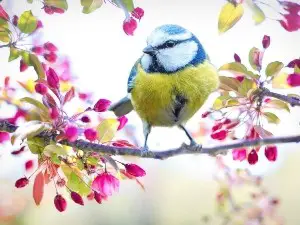
Celery is a superfood, people eat it for its freshness, crunch, and nutrients. But do animals like celery? Can birds eat celery?
Birds can eat celery. This superfood contains a number of beneficial vitamins and minerals including vitamin A, C, K and potassium to name a few. When feeding celery to birds you need to remove the stings or blend the plant. Also, buy organic celery or wash off the pesticides before feeding birds.
I’ll admit, celery isn’t my favorite veggie. It is a superfood but there’s concern about using it as feed for pets. Today, we’re answering the question once and for all, can birds eat celery? This article will be helpful for any bird owners, bird lovers, or curious people.
More than 100,000 bird species are cataloged. Unfortunately, over 3 billion die each year from various issues including unhealthy and unwholesome diets. We know that birds eat insects and birdseed but is this all they need? Do they need vegetable greens and do they need celery?
Table of Contents
Can birds eat celery?
Yes, birds can eat celery. Most birds are omnivores and thus have diverse dietary needs.
Wherever their habitat is, birds need a wholesome mix of more than just seeds, fruits, insects, and meat. We also know that birds often eat and need vegetables.
Benefits of celery:
For moms everywhere, it’s no surprise that vegetables like celery are essential foods.
Dieticians and nutritionists say celery is a superfood. It is nutrient-rich, and it offers benefits such as soothing the nervous system, easing weight loss, improving digestion, protecting eyesight, reducing inflammation, reducing cholesterol, lowering blood pressure, and combating cancers in humansAs nature would have it, mother birds are of
Veterinary studies show that celery benefits birds in many ways. Celery has vitamin A which maintains feather plumage and colour. It has vitamin C, vitamin C keeps birds from damaging themselves.
Celery contains vitamin K, vitamin K supports healthy blood. Vitamin B9 in celery is needed for cell growth and metabolism.
Potassium in celery is vital to muscle strength, nervous systems, and fluid balance. Overall birds need celery to grow and be healthy.
Dangers of celery for birds:
That being said, there are some dangers of birds eating celery. Celery stalks are stacked with stringy fibers that can block bird digestive systems or what’s referred to as crop impaction.
Also, this plant is on the list of top foods produced with the most pesticides.
Strings can be seen in celery but most pesticides cannot be seen not smelt. The average store-bought celery contains over 13 different pesticides.
While you can peel fruits and trim some vegetables you can’t do this with celery. Pesticides are toxic to birds often killing them.
So, beware of pesticides before popping a piece of celery as a treat for street or home pigeons.
Studies show that celery can cause constipation, agitation, bacterial infections, vomiting, depression, and even fatal death in birds.
How to feed birds celery
If you want your bird to enjoy and benefit from celery you still can. There are steps you can take to ensure birds’ intake of celery is safe.
There are several ways of preparing this food so that it doesn’t become a risk. To remove the risk of crop impaction from strings, it’s best to chop and slice the stalks and leaves thinly into fine pieces while making sure to remove excessive strings.
For the bird’s safety, skip the stalks and leaves and just feed the birds celery seeds. Seeds are just as healthy and nutritional.
Or, if you want to use the whole plant, fire up the blender and make your pet a smoothie. Blend some fruits and celery together to treat your pet.
Removing pesticides takes a bit more time but it’s worth the wait. It’s best to buy organic foods as they have no pesticides. To be safe, give vegetables a good wash.
Washing produce under running water is good but purchasing food produce cleaners is better.
You can also make a saltwater bath to clean your veggies. Also, a good 15-minute soak in a solution made of baking soda and water will get the job done.
Some have suggested washing produce in vinegar but birds may not like the after smell.
FAQ:
Alternative vegetables you can feed birds
While celery is a superfood packed with nutritious health benefits for humans and birds, there are other vegetables you should also consider.
Birds also like lettuce cabbage, collard greens, and kale. These are rich in vitamins A, ,C and K, plus they have sufficient fiber to ensure their digestive systems are working well.
Birdseed, suet, and nectar are great bird feed, but birds need vegetables too. Some birds go for lentils such as corns, cooked peas, and beans. Diced tomatoes and carrots are also loved by birds. Remember to wash the produce before feeding birds.
Birds eat a variety of foods. Here are some articles looking at if birds eat quinoa, watermelon, pineapple, cheese, cucumber and eggs. Click the links to read more.
What is the healthiest thing to feed birds?
The healthiest thing to feed your bird is a good well-rounded diet. This would include seeds, nuts, mealworms, insects, vegetables and fruits
Conclusion
Birds can and do eat celery. Celery is nutritious and wholesome for humans and birds alike. If you take the time to prepare the celery by removing the strings and washing away pesticides, the plant can be great for birds.
Birds are omnivores they need sustainable sources of vitamins, minerals, electrolytes, fibre, and potassium to keep their flapping wings, running feet and plumage in top conditions. Celery does the job.

